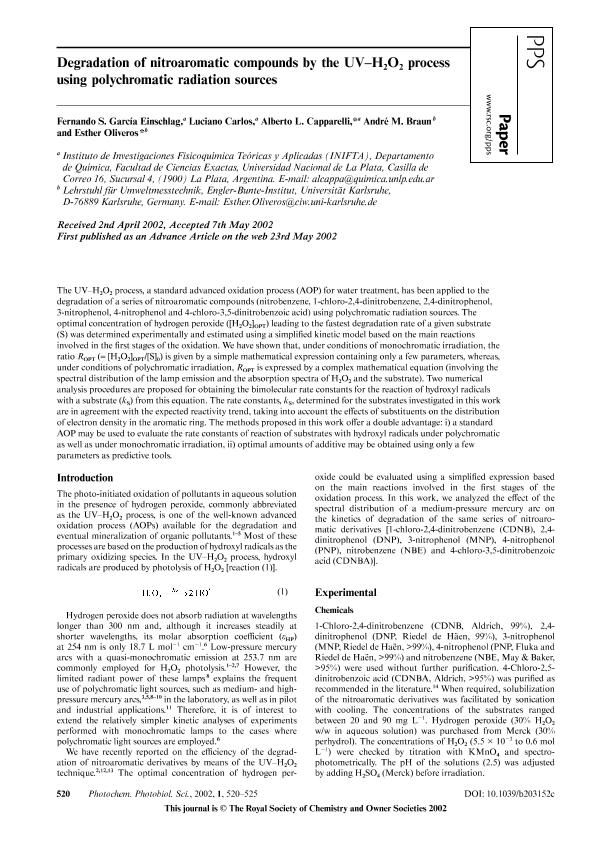Mostrar el registro sencillo del ítem
dc.contributor.author
Garcia Einschlag, Fernando Sebastian

dc.contributor.author
Carlos, Luciano

dc.contributor.author
Capparelli, Alberto Luis

dc.contributor.author
Oliveros, Esther
dc.contributor.author
Braun, André
dc.date.available
2017-12-10T15:33:15Z
dc.date.issued
2002-12
dc.identifier.citation
Garcia Einschlag, Fernando Sebastian; Carlos, Luciano; Capparelli, Alberto Luis; Oliveros, Esther; Braun, André; Photodegradation of nitroaromatic compounds by the UV/H2O2 process using polychromatic radiation sources; Royal Society of Chemistry; Photochemical and Photobiological Sciences; 1; 12-2002; 520-525
dc.identifier.issn
1474-905X
dc.identifier.uri
http://hdl.handle.net/11336/30062
dc.description.abstract
The UV–H2O2 process, a standard advanced oxidation process (AOP) for water treatment, has been applied to the degradation of a series of nitroaromatic compounds (nitrobenzene, 1-chloro-2,4-dinitrobenzene, 2,4-dinitrophenol, 3-nitrophenol, 4-nitrophenol and 4-chloro-3,5-dinitrobenzoic acid) using polychromatic radiation sources. The optimal concentration of hydrogen peroxide ([H2O2]OPT) leading to the fastest degradation rate of a given substrate (S) was determined experimentally and estimated using a simplified kinetic model based on the main reactions involved in the first stages of the oxidation. We have shown that, under conditions of monochromatic irradiation, the ratio ROPT (= [H2O2]OPT/[S]0) is given by a simple mathematical expression containing only a few parameters, whereas, under conditions of polychromatic irradiation, ROPT is expressed by a complex mathematical equation (involving the spectral distribution of the lamp emission and the absorption spectra of H2O2 and the substrate). Two numerical analysis procedures are proposed for obtaining the bimolecular rate constants for the reaction of hydroxyl radicals with a substrate (kS) from this equation. The rate constants, kS, determined for the substrates investigated in this work are in agreement with the expected reactivity trend, taking into account the effects of substituents on the distribution of electron density in the aromatic ring. The methods proposed in this work offer a double advantage: i) a standard AOP may be used to evaluate the rate constants of reaction of substrates with hydroxyl radicals under polychromatic as well as under monochromatic irradiation, ii) optimal amounts of additive may be obtained using only a few parameters as predictive tools.
dc.format
application/pdf
dc.language.iso
eng
dc.publisher
Royal Society of Chemistry

dc.rights
info:eu-repo/semantics/openAccess
dc.rights.uri
https://creativecommons.org/licenses/by-nc-sa/2.5/ar/
dc.subject.classification
Otras Ciencias Químicas

dc.subject.classification
Ciencias Químicas

dc.subject.classification
CIENCIAS NATURALES Y EXACTAS

dc.title
Photodegradation of nitroaromatic compounds by the UV/H2O2 process using polychromatic radiation sources
dc.type
info:eu-repo/semantics/article
dc.type
info:ar-repo/semantics/artículo
dc.type
info:eu-repo/semantics/publishedVersion
dc.date.updated
2017-11-24T13:43:57Z
dc.journal.volume
1
dc.journal.pagination
520-525
dc.journal.pais
Reino Unido

dc.description.fil
Fil: Garcia Einschlag, Fernando Sebastian. Consejo Nacional de Investigaciones Científicas y Técnicas. Centro Científico Tecnológico Conicet - Santa Fe. Instituto de Desarrollo Tecnológico para la Industria Química. Universidad Nacional del Litoral. Instituto de Desarrollo Tecnológico para la Industria Química; Argentina
dc.description.fil
Fil: Carlos, Luciano. Universidad Nacional de La Plata; Argentina
dc.description.fil
Fil: Capparelli, Alberto Luis. Universidad Nacional de La Plata; Argentina
dc.description.fil
Fil: Oliveros, Esther. Universidad Nacional de La Plata; Argentina
dc.description.fil
Fil: Braun, André. Universitat Karlsruhe; Alemania
dc.journal.title
Photochemical and Photobiological Sciences

dc.relation.alternativeid
info:eu-repo/semantics/altIdentifier/doi/http://dx.doi.org/10.1039/b203152c
Archivos asociados
